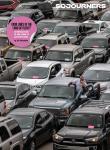Biblical roots of justice
The founding story in the Bible tells of a diverse group of freedom fighters who have been on the march since the burdens of Egyptian slavery and scarcity got to be too much, since leaders like Moses, Aaron, Miriam, and many others—named and unnamed—came forward to say, “It doesn’t have to be this way.” And God sent plagues and pandemics that only hardened the heart of the ruling authorities, who doubled down on misery, dispossession, and militarization.
After approaching the Sea of Reeds, having to get neck-deep before the waters parted, wanting to be free and full so much that they were willing to die, the freedom fighters crossed to the other side, as the weapons and chariots of empire were swallowed up.
But the freedom fighters had to keep marching. They weren’t yet in the promised land. They had escaped from Egypt only to still struggle. They had pulled off a mighty protest, but it was going to take more. They had been organizing for weeks, months, years. And people were still suffering. They were still suffering.
So they sang, “Hold on just a little bit longer.” And the people called out to Moses and to God for food, for water. The water was too bitter at Marah—too much oppression had turned it so—so they demanded water, and God provided. There was no food—empire had hoarded it for the wealthy—so God rained down manna, the substance of prosperity and liberation for all, which no one could hoard, which no one could lack, which showed up day after day.
Then, in Deuteronomy (and Leviticus), the people set forth laws that eliminate state tribute, call for a year of remission of debts (Deuteronomy 15:1-11), free the slaves (15:12-18), forbid interest and pledges from the weak (23:20, 24:17), and dictate that harvest leftovers be left in fields for the hungry (24:19). The prophets suggest constructing society around the needs of the poor: Stop gentrifying communities, stop allowing the cops to terrorize, start paying your workers just wages, build your society from the bottom up.
Veritably, these instructions remind the people that God led them out of slavery in Egypt and—with the highest commandment, the Shema Yisrael—that we are to love our God with all our heart and mind and soul. And we are not to worship gold or riches or mammon. We are to organize society around the least of these, who are most of us.
There need be no one poor
We learn in the New Testament that the first thing the early church did was make sure everyone was living their fullest lives. Acts 4 reminds us that “all the believers were one in heart and mind. No one claimed that any of their possessions was their own, but they shared everything they had. With great power the apostles continued to testify to the resurrection of the Lord Jesus. And God’s grace was so powerfully at work in them all that there were no needy persons among them.”
Indeed, the Bible, and Jesus in particular, is clear on what is required of those who profess to be followers of Jesus and are committed to bringing God’s empire of love, justice, and forgiveness here on earth. Jesus travels through the land healing, expanding health care, feeding the people, and turning over tables and systems of injustice.
The prayer that Jesus teaches his followers speaks to his core beliefs and commandments: “Your will be done, on earth as it is in heaven. Give us today our daily bread. And forgive us our debts, as we also have forgiven our debtors. And lead us not into temptation, but deliver us from the evil one.” The Lord’s Prayer is very clear that the material position of the people is of great interest to God. It exhorts people and nations to release those imprisoned by injustice, feed everyone, and resist the temptations and trappings of the unjust, those who pass policies that hurt women and children and the poor. Forgiveness is a key theme—but it is a theme connected to generosity, overturning unjust systems, and community prosperity. It’s about reconstruction and restitution, not just saying “I’m sorry.”
Later in Matthew, Jesus instructs the rich young man who wishes to inherit eternal life to give literally everything to the poor and come follow Jesus. In fact, the logic of Jesus’ teachings is about abundant life for all. And it follows that nations should spread love and justice; they should forgive debts and trespasses throughout the whole world. We must bring good news to the poor—not the bad news of eviction, the lack of health care, unemployment, poverty, or the racism of empire.
Abundance over scarcity
Throughout sacred scripture—including the codes, policies, and regulations in the Bible as well as in the prophets, gospels, and letters—there is a call to end exploitation and to attend to the poor, a mandate of Sabbath rest and Jubilee years, and a prohibition against charging interest on survival loans or profiting from pandemic. There are commandments to pay living wages promptly, to bring equity to legal proceedings, to give to everyone who asks of you, to welcome the immigrant neighbor, to care for the needs of the entire community, and to stop depriving those who are poor of their rights.
In the books of Moses, the prophetic critiques, the parables told, and the ministries described throughout the Bible, God’s beautiful creation is lauded, and God’s intention for that abundance to be a blessing to all—not an elite few—is the central theme. In truth, the instruction in scripture is that society must be organized around the needs of people who are poor, suffering, and marginalized—that when we lift from the bottom, everybody rises. Whenever policies to share in the blessings of creation are lifted up in the Bible, there is a reminder of exploitation, oppression, and the need to struggle for liberation, lest we forget that while empire, unjust policies, and immoral systems lead to poverty, this is not God’s will.
To return to that passage weaponized against those challenging the inevitability of poverty and scarcity: When Jesus says, “the poor will always be with you,” he is referencing just such a policy and just such a reminder, from Deuteronomy 15. In this chapter, we are told that as long as we forgive debts, free those in bondage, give to others without any expectation that we’ll be paid back, and care for each other in times of crisis—when we build a movement of those considered expendable, when we confront the powers and principalities, when those wounded by deep social and economic wounds heal through mutual solidarity and moral action—only then will there be “no poor among you.”
But we are also warned that if we instead refuse to organize our society around the needs of the poor rather than the endless, systemic greed of the powerful, then poverty and want can never be banished.
Hope in hard times
At this moment, this is a hopeful lesson and a hard one. We live in a nation where there are 140 million people who are poor or who are one fire, health crisis, job loss, or severe storm away from deep poverty. A nation where, during a pandemic, more than 12 million people have lost their employer-based health care—adding to the 87 million who already had inadequate health care; where nearly 12 million renters are behind in rent and could face eviction in the coming months; where 26 million people reported not having enough to eat, but 72 billion pounds of food goes to waste each year.
In truth, these are exactly the times when prophets rise up to remind us of God’s demand for justice—and God’s judgment of those whose power and wealth rests on the dispossession of the rest of society. Jesus’ ministry began in a time like ours, when the Roman Empire was strangling millions of poor people and calling it peace. He began by declaring, drawing directly from the prophet Isaiah, “The Spirit of the Lord is upon me, and he has anointed me to preach good news to the poor.” What is good news to the poor except for the end of poverty, a sharing of abundance? The prophets go on to proclaim “liberty to the captives”—a phrase that, in turn, comes from the Jubilee laws of Leviticus.
The Jubilee laws, the shemittot—the Sabbath year prescriptions from the Hebrew scriptures that Jesus references—are both pietistic and economic; the instructions include making a release of debts as a way to honor and worship God. They explain that God commands people to give to their neighbors and to ensure that all needs are met. They assert that people having to cry out against their creditors is a sin against God (not just the mistreatment of another person). The core message of these passages is the elimination of poverty and inequality and God’s will that all have enough. Notably, the Sabbath—the rest required by God in order to worship God, protect life, and ensure material well-being and abundance for all—is one of the earliest legislations in the Bible.
Indeed, Jesus proclaims jubilee in his inaugural sermon and through his peripatetic ministry. He references manna and systems where everybody has enough and no one goes hungry. He heals the sick, feeds the hungry, and turns over the tables of oppression.
Christ Jesus does not proclaim: “I didn’t make enough food for everyone to eat.” Nor “my abundance will trickle down from the rich to the rest.” He does not suggest that anyone should profit off a pandemic, nor that “I want Peter to have to rob Paul” to be able to pay bills. He does not say “Get a job!” to the homeless of society, nor “you shall not bear children” to the refugee mothers of his community. He does not proclaim that a little charity is as good as you all can do, nor that the powerful should be exempt from taxes but that the poor shall pay for the business escapades and pleasures of the rich. He does not teach that private insurance companies can pay families of those bruised and battered by the legions of empire in order to leave the governing authorities unaccountable. And he never once suggests charging lepers a co-pay or cutting people off from access to health care during a public health crisis.
In the midst of all this suffering, despair, and loss of life, let us remember that the God we follow cries out, “I am the one who led you out of Egypt.” That God reminds us that how we treat the poor, how we treat the immigrant neighbor, is how we honor and worship God. So, in this season, who do we worship? What do we honor? What will we do? And, in the words of Archbishop Desmond Tutu of South Africa, “Who will join God?”

Got something to say about what you're reading? We value your feedback!

